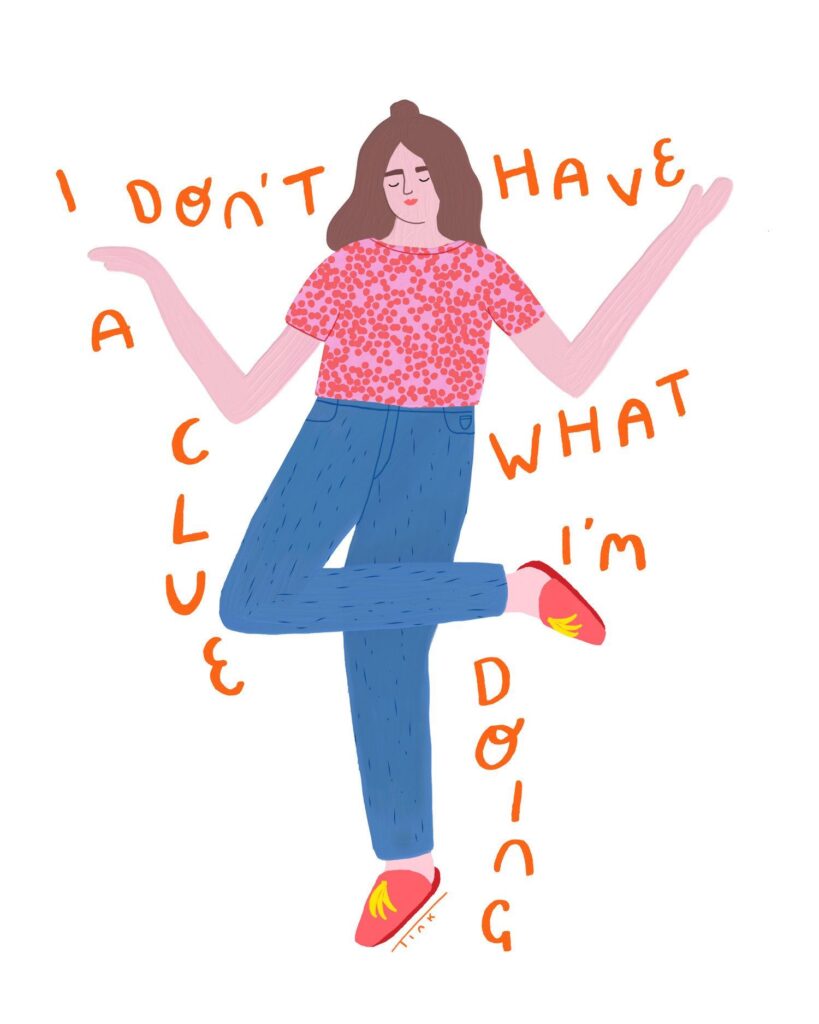On many days we wake up feeling like a failure. And you know what’s harder than feeling not good enough? It’s the fact that we aren’t able to tell if it’s the artist’s imposter syndrome hitting again or if we actually suck.
Creative brains come with a preset huge amount of self-doubt. Moreover, the creative process and the nature of artistic endeavors is a very insecure way of living. We create things that we imagine, plan, and dream about but at the end of the day, we are entitled to share our work and put it on display for external validation which may often be more destructive than you would expect it to be.
What is an artist imposter syndrome?
You may not know the definition but you surely know the feeling. According to Merriam-Webster’s Dictionary, An artist imposter syndrome is a persistent doubt concerning an artist’s own abilities or accomplishments accompanied by the fear of being exposed as a fraud despite evidence of one’s ongoing success.
I too have not been able to celebrate some milestones and a handful of accomplishments because I have deeply felt unworthy of the spotlight. I have told myself, it’s nothing to be proud of and that no matter what I achieve, it’s just not good enough compared to what’s out there.
How does an artist imposter syndrome manifest in our actions and thoughts?
1- Comparing yourself and your work to others
We are all guilty of it! But the moment your mind tells you that someone’s work is better than yours (unless it was somebody pushing that idea on you or making you feel comparable), it’s your imposter syndrome speaking or resistance as Steven Pressfield called it in his book The War of Art.
Read this article: Books that Changed my Life as an Artist
2- Rejecting compliments on your work
Often, I compliment artists on their work and the moment someone says “Nah, it was just a little practice piece” or “You should see a certain artist’s work” when I know damn well that the work I am looking at, took a ton of their energy and time to exit. It hurts me to see an artist struggle with imposter syndrome as much as it hurts me to feel it because centuries later and we’re still unable to believe that we have it in us to create and we have it in us that viewers will be moved by the work we create.
3- Self-doubt and perfectionism
I can’t tell you about it, because you know exactly what I’m talking about. You can’t even bring yourself to start the work because of it sometimes and when you finally do, all you can think of is other people’s opinions and critiques to the point that you just decide to keep your work hidden.
Read this article: Why do you need Pinterest as an artist?
4- Inability to sell your work
Little me speaking. For years, I have refused to sell my paintings because of the crazy amount of attachment I have had to them. I felt like I will never be able to create something similar to that artwork again. Here’s big me here telling you to sell those paintings and give them away because you are going to create better paintings. You are going to improve and hate how basic your old paintings are. Just sell them now, because you will end up painting over them later.
5- Feeling like you don’t belong to the art scene
Again, to the 17 years old me! Go to those galleries and museums because you enjoy them and you love exploring art. Stop feeling out of place in art events! You are an art lover and these places were made for you.
Is it imposter syndrome or do you actually suck as an artist?
I want you to know that the natural order of things is that we need to suck at things before becoming awesome. As a beginner, it’s absolutely fine to create art that doesn’t look great even if “you’re talented“. Art is less about talent and more about practice and perseverance.
One of the major things that stagnate the progress of an artist is the fact that they start creating art that looks decent, do not face any self-doubt or receive critique in the beginning, then end up arrogant and full of themselves to wake up one day and see how many great artists are present at the art scene when they are stuck with a sick ego and a mediocre work.
An artist who sucks at art is one who doesn’t create. Who are unable to get over their self-sabotaging thoughts and who create for a reason other than creative integrity and an innate deep desire to make art.
As long as you are practicing, learning, trying, and putting yourself out there; and even if it’s incredibly challenging, it’s just imposter syndrome and you DO NOT SUCK.
How to heal your artist imposter syndrome?
I haven’t healed mine, to begin with. And as Steven Pressfield says: “Fear doesn’t go away. The warrior and the artist live by the same code of necessity, which dictates that the battle must be fought anew every day.”. But I am still going to share with you some tips that do work to shut down your imposter syndrome for a little while until it hits again.
1- Know your brain
It all starts and ends there. You are continuously taking part in monologues with your own brain and you’re teaching it how to act and what to focus on. If you do not heal your own patterns, no one is gonna get inside your brain and fix it for you.
2- Why do you create?
I hate this question just like you do. When people ask me why I paint, I have no answer! It’s like asking someone why they love their mother. But you need a strong why for you to continue creating. If your answer is money or applause, I’m sorry to tell you that you have chosen the very wrong path.
I blog about art because I was once a young self-taught artist who needed guidance and a mentor figure but had no one with the same mental model. I paint because I have a desire to do so and I don’t know where it comes from. And that in itself makes me want to keep going.
As a person, I am beyond my art and I am so much more than what I am able to create but I am using this journey to figure myself out and use what I learn to make shortcuts for other creative people.
3- Practice
Not gonna tell you to practice art because I have talked about it so much that I don’t even wanna get into it again XD. Practice celebrating your accomplishments and patting yourself on the back. If you feel cringed to talk about it to your friends, talk about it in your journal. Sit down and take the time to recall the greatest things you’ve done and how well you’re doing to walk towards your goals. Imagine your future self in a life you’d love to manifest. One that is not held by fear or resistance and that is lived by purpose and potential.
4- Separate your feelings from your facts
Easier said than done of course. Feelings and thoughts are not always true. So in order to continue taking action consistently, you have to be willing to leave your thoughts for a moment and stop letting your emotions fog your vision and perception. Nobody cares if your art is bad! It’s your story and you can write it however you want. And if you are afraid someone will judge you, block them. If you can’t block everyone, start a new website, a TikTok account, or an Instagram account and block everyone there, make it your goal to develop and put yourself out there away from any peer pressure or potential judgment.
Conclusion
Your mindset and how you talk to yourself are ruling your life and defining your future.
That strong feeling that you do not deserve the success you have achieved and everyone around you is mistaken about you and sooner or later will realize that you are an “imposter” is going to knock you down and push you to die before your death.


